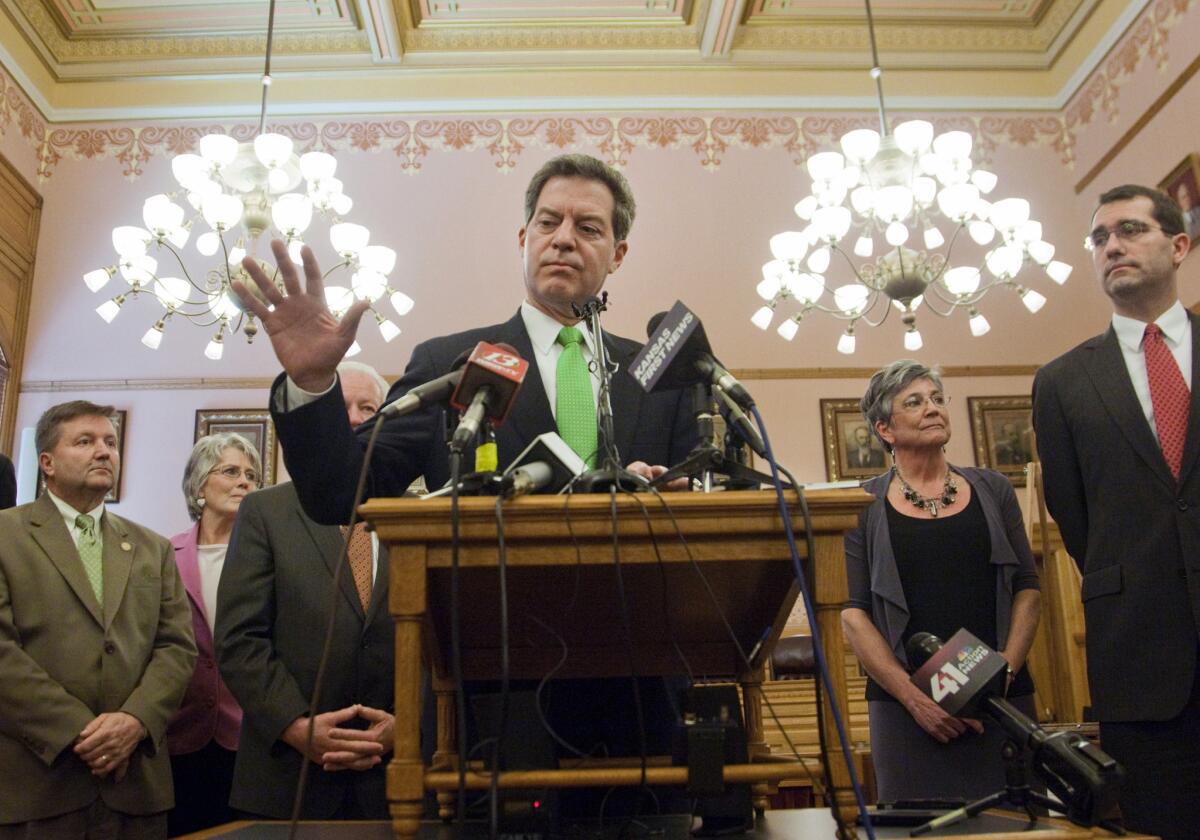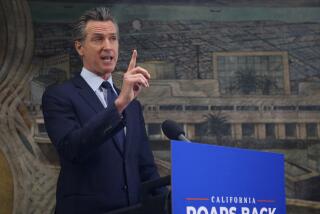How Tea Party tax cuts are turning Kansas into a smoking ruin

Kansas Gov. Sam Brownback promised that his steep tax cuts would supercharge the state’s economy. But job growth in Kansas trails the nation. Above, Brownback at a news conference in March.
- Share via
Sam Brownback, the Republican governor of Kansas, doesn’t just believe in whistling past the graveyard--he’s willing to stroll past it in full-throated song.
The graveyard is where the economy of Kansas has been buried since 2012, when Brownback and his Republican state legislature enacted a slew of deep tax cuts in a tea party-esque quest for economic “freedom.”
“Our new pro-growth tax policy will be like a shot of adrenaline into the heart of the Kansas economy,” he promised then. Brownback’s tax consultant, the supply-side guru Art Laffer, promised Kansans that the cuts would pay for themselves in supercharged economic growth.
Instead, job growth in Kansas trails the nation. The state’s rainy-day fund is dwindling to zero. Month after month, revenue comes in even lower than fiscal officials’ most dire expectations.
In the rest of the country, school budgets are finally beginning to recover from the toll of the last recession; in Kansas, they’re still falling. Healthcare, assistance for the poor, courts, and other state services are being eviscerated.
Who’s benefiting? The rich, including those proud offspring of Wichita, Kan.: the Koch brothers.
Despite all this, Brownback resorted to an op-ed in the Wall Street Journal a few weeks ago to declare that “the early results are impressive.” Among other statistics he cited, “In the past year, a record number of small businesses — more than 15,000 — were formed.”
Yes, but as shown by the Center on Budget and Policy Priorities, a Washington economic think tank, 16,000 disappeared. And many of those businesses that Brownback crowed about were surely created to take advantage of one of the tax-cut quirks Brownback enacted. This is the elimination of all taxes on partnerships, sole proprietorships, and LLCs that pass through their tax liabilities to their owners. That allows everyone from freelancers and petty contractors to huge partnerships to avoid any state income tax at all, as long as they’re organized as a certain type of “small business.”
Brownback’s policy, and his claims about its outcome, define the term “ideological” -- the imposition of preconceived notions on a contradictory reality.
The record of Kansas since 2012 shows the folly of such draconian cuts in revenue. It’s one thing to enact targeted cuts in tax rates during an economic upswing, when such a policy can add fuel to job generation. It’s quite another to do so blindly during a slump, when cuts in state services undermine efforts at recovery.
Brownback’s tax policy came right out of the conservative playbook. His 2012 package cut the top two personal income tax rates from 6.45% (on income over $60,000) and 6.25% (on income between $30,000 and $60,000) to 4.9%. The rate on income under $30,000 was pared to 3% from 3.5%. Pass-through business income was made fully tax-exempt. The law increased the standard deduction, but also eliminated several tax credits that assisted the poor.
More tax changes were enacted last year. The top rate was cut to 3.9% in stages through 2018. But other cuts were reversed; much of a sales tax reduction was canceled, and the standard deduction was cut back, effectively raising taxes for the middle- and working-class.
In all, as the CBPP documents, the changes will cut the taxes of the wealthiest 1% of Kansans by 2.2%. The poorest 20% of Kansans will see their taxes rise by 1.3%.
The impact on overall state revenue has been devastating. Despite Laffer’s prediction, the state ended fiscal 2014 with a shortfall of $338 million.
Brownback continues to promise his citizens that growth is just around the corner. But there’s no evidence that the kinds of cuts he promoted have anything to do with genuine economic growth. Indeed, it’s likely that preserving the quality of crucial state services is more important. That’s a policy pursued in California under Gov. Jerry Brown, who successfully pushed to raise taxes after the recession; the state’s job growth since then has left Kansas and the country as a whole in the dust.
“States considering deep tax cuts in hopes of sparking a surge of economic growth should look carefully at Kansas,” the CBPP suggested in March. Yes, look carefully -- and run the other way.
Keep up to date with The Economy Hub by following @hiltzikm.
More to Read
Inside the business of entertainment
The Wide Shot brings you news, analysis and insights on everything from streaming wars to production — and what it all means for the future.
You may occasionally receive promotional content from the Los Angeles Times.











